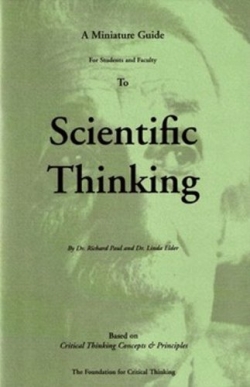A Miniture Guide For Students and Faculty To Scientific Thinking

Buy online ($)
Type
Book
ISBN 10
0944583180
ISBN 13
9780944583180
Category
How To
[ Browse Items ]
Publication Year
2008
Publisher
Foundation for Critical Thinking, United States
Pages
48
Description
A critical approach to learning science is concerned less with accumulating undigested facts and scientific definitions and procedures, than with learning to think scientifically. As we learn to think scientifically, we inevitably organize and internalize facts, learn terminology, and use scientific procedures. But we learn them deeply, because they are tied into ideas we have thought through, and hence do not have to “re-learn” later. A critical approach to learning science requires us to ponder questions, propose solutions, and think through possible experiments. A well cultivated scientific thinker:
• raises vital scientific questions and problems, formulating them clearly and precisely;
• gathers and assesses relevant scientific data and information, using abstract ideas to interpret them effectively;
• comes to well-reasoned scientific conclusions and solutions, testing them against relevant criteria and standards;
• thinks openmindedly within convergent systems of scientific thought, recognizing and assessing scientific assumptions, implications, and practical consequences; and
• communicates effectively with others in proposing solutions to complex scientific problems.
Scientific thinking is, in short, self-directed, self-disciplined, self-monitored, and self-corrective. It presupposes assent to rigorous standards of excellence and mindful command of their use. It entails effective communication and problem solving abilities as well as a commitment to developing scientific skills, abilities, and dispositions.
This guide is designed for students and faculty. It consists of the essence of scientific thinking concepts and tools. For faculty it provides a shared concept of scientific thinking. For students it is a scientific thinking supplement to any textbook for any science course. Faculty can use it to design science instruction, assignments, and tests. Students can use it to improve their perspective in any domain of science.
• raises vital scientific questions and problems, formulating them clearly and precisely;
• gathers and assesses relevant scientific data and information, using abstract ideas to interpret them effectively;
• comes to well-reasoned scientific conclusions and solutions, testing them against relevant criteria and standards;
• thinks openmindedly within convergent systems of scientific thought, recognizing and assessing scientific assumptions, implications, and practical consequences; and
• communicates effectively with others in proposing solutions to complex scientific problems.
Scientific thinking is, in short, self-directed, self-disciplined, self-monitored, and self-corrective. It presupposes assent to rigorous standards of excellence and mindful command of their use. It entails effective communication and problem solving abilities as well as a commitment to developing scientific skills, abilities, and dispositions.
This guide is designed for students and faculty. It consists of the essence of scientific thinking concepts and tools. For faculty it provides a shared concept of scientific thinking. For students it is a scientific thinking supplement to any textbook for any science course. Faculty can use it to design science instruction, assignments, and tests. Students can use it to improve their perspective in any domain of science.
Number of Copies
1
| Library | Accession No | Call No | Copy No | Edition | Location | Availability |
|---|---|---|---|---|---|---|
| Main | 48 | 9-11 | 2 | Yes |




